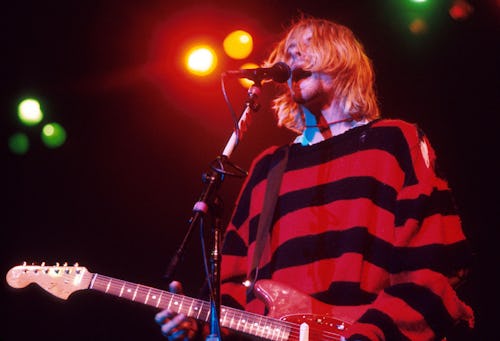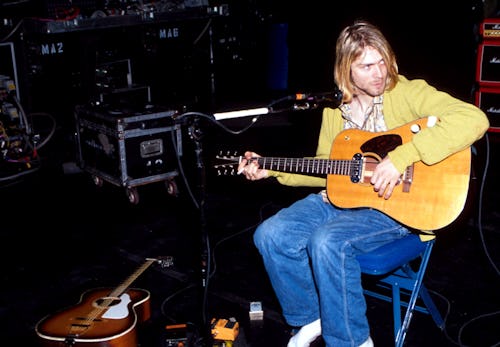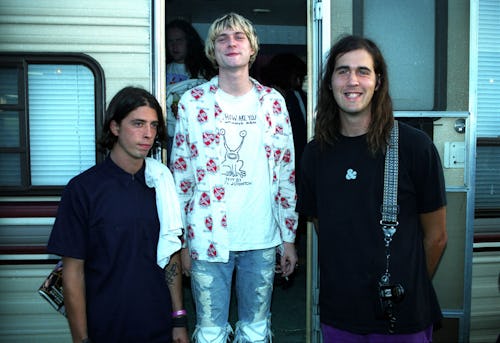34 Years Ago, The Most Important ‘90s Rock Band Quietly Dropped Their Most Pivotal Album

Before Kurt Cobain sang “entertain us!” as a kind of threat in 1991, his immortal band Nirvana dropped an album in the last decade of the ‘80s, without which, grunge as we know it could have never blown up. On June 15, 1989, Nirvana released Bleach, a debut album that attracted little to nothing in the way of mainstream attention or validation upon its release. That’s because it was specifically designed not to appeal to major label executives top 40 radio DJs or anyone else involved in the pop music machinery. This, of course, was its prescient genius. And without this album, the ‘90s as we know it simply couldn’t have happened. Nirvana begins with Bleach.
In the college/alternative rock scene of the late 1980s and early 1990s, where Nirvana frontman Kurt Cobain learned his craft and came of age, being commercially successful was generally, if not invariably, seen as a moral failure. Musicians like Cobain were supposed to be motivated by art and self-expression, not by the same desire to make money and attain the trappings of wealth and fame that motivate seemingly everyone in capitalist societies.
Cobain would eventually sell millions of albums and become world-famous. It could very well have been the worst thing that happened to him. Cobain might have survived indie rock semi-fame and become a distinguished elder statesman of the scene but pop super-stardom destroyed him. When Bleach was released its ferocious central creative force was just twenty-two years old. Cobain was barely old enough to drink and only a few years removed from his teenage years and high school.

Cobain was precociously talented but he was also very much a kid. Bleach feels like the work of someone still immersed in the intense emotional maelstrom of adolescence. The Nirvana icon was legendary for writing lyrics that appeared to be deep and profound but were nonsensical on the surface. The lyrics to Bleach, however, are nonsensical in a way that seldom feels deep or profound. He alternates between lyrics that are defiantly nonsensical and those that are, if anything, overly direct, like “Negative Creep.” That trademark exercise in performative self-loathing has a buzzsaw hook and an all too relatable chorus where Cobain yells, “I’m a negative creep and I’m stoned!”
Bleach is rooted in the sound and aesthetic of a grunge scene that prioritized noise, volume, and energy over polish and professionalism. Nirvana’s debut is appropriately noisy, loud, sludgy, and angry, an incoherent howl of rage from one of rock’s most sanctified sufferers.
It’s very deliberately and purposefully not clean, polished, commercial, or professional-sounding. With its eyesore of a cover and low-fi production, Bleach looks and sounds like a typical grunge album with two very noticeable exceptions. And these fascinating outliers pointed the way towards the world-conquering rock stars and hitmakers Nirvana would become after it gave original drummer Chad Channing the old heave-ho in favor of Dave Grohl. With a tuneful jangle that recalls both R.E.M and Big Star, “About a Boy” is a glorious exception, an unabashedly catchy and accessible song on an album otherwise devoted to pissing people off.
Cobain was not a fan of Bleach. He was in a bad headspace when he wrote it (not surprising!) and apparently came up with lyrics the night before recordings but “About a Boy” is autobiographical and tender in a way nothing else on the album is. The preeminent pop martyr felt pressure from his hip and happening indie label Sub Pop to conform to the loud, heavy, and defiantly non-commercial grunge scene but “About a Boy” is unabashedly a great pop song from what would soon become a great pop band. And yet, with “About a Boy” Cobain stops slouching about belligerently and invests his tender heart and soul into the first song to really illustrate what Nirvana was capable of.
The other standout from Bleach is “Love Buzz”, a ferocious cover of a 1969 song by Dutch psychedelic rock band Blue Cheer. Like “About a Boy”, “Love Buzz” finds inspiration a million miles away from the unrelenting pessimism and sonic sludge of Grunge. Among his many other admirable qualities, Cobain had impeccable and sometimes obscure taste in music and covers. He made The Meat Puppets and The Vaselines famous by performing their songs. Cobain does the same for Blue Cheer on Bleach and “Love Buzz.” The song allows Cobain to temporarily escape the bratty nihilism of the rest of the album and be goofy, hot, and incongruously groovy.
Bleach is the archetypal raw, promising debut. It attracted the attention of future Garbage drummer Butch Vig, who saw something special in Cobain. Nevermind, which came out just two years after Bleach, represented a huge leap in the band’s evolution. Cobain was no longer handcuffed to the noisy joylessness of grunge purity. Three factors pulled Cobain and Nirvana irrevocably in the direction of pop stardom. This is when Channing was replaced with the much more versatile, pop-friendly drummer in Dave Grohl. The group hooked up with producer Vig, who made them slick, commercial, and wildly popular in a way that ultimately might not have ended up working in Cobain’s favor.

Lastly, the trio traded in hip, small, independent Sub Pop for major label powerhouse Geffen. Needless to say, Geffen did not have complicated or contradictory ideas about success. They were out to make money. From the moment of its release, Nevermind made a lot of people a lot of money. It’s so successful that it made Sub Pop a lot of cash as well, since a lot of fans went back and bought Bleach and may or may not have been extremely disappointed.
Nirvana’s career as recording artists lasted a mere half-decade separating 1989’s Bleach from 1994’s Nirvana Unplugged. By then Cobain had evolved past the raucous rebellion of Bleach but Nirvana Unplugged nevertheless begins with a tender acoustic version of “About a Boy.”
It was Cobain's way of acknowledging that what we know and love and miss about Nirvana really began with “About a Girl’ and, to a lesser extent, “Love Buzz” and not the rest of its promising but exceedingly limited debut.
Cobain would become an instant icon and a pop culture martyr. The beginnings of everything that he would become can be found in Bleach, albeit in an angry, embryonic form.